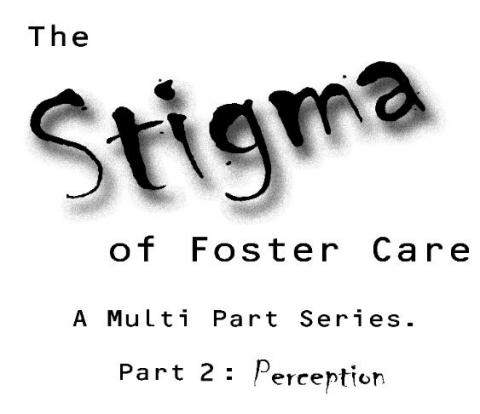
The silhouette of a small solitary torso slowly appears on screen. As the camera
draws closer, the light begins to show features of the figure, revealing a child.
The child is dirty the eyes sad, a look of loneliness is shown. How did the child
get here? Why is this child alone? What caused this child to become so vulnerable?
Who is this child?
You’re intrigued aren’t you? Of course you are, why wouldn’t you be,
Hollywood has always been fascinated by orphans, abandoned children and
more recently foster kids. From “The Kid” and “Boystown” to “Martian Child”
and “Antoine Fisher” the movies have always been the home for the unfortunate
, disillusioned and hopeless and the place where these same individuals can
morph into the fortunate, heroic and beacons of hope.
To truly understand what keeps drawing the executives in lalaland back to
our stories you need only talk to ANY orphan or adopted/foster kid. The phrase
“it was like the movies” will inevitably be uttered. “My adoptive parents picked me
up and took me home, the house was beautiful, there was a white picket fence,
just like the movies”, or, “My foster dad was a tyrant, into barge into my room at
night barking orders, like in the movies” and in extreme circumstances “I was left in
front of a church just like in the movies.”
Granted, the last one actually would make a great film, points being the lives of
orphaned and adoptive/foster kids’ lives are already fraught with built in storylines
and all different levels of drama. And when a child overcomes the demons and obstacles it is cause for celebration and it is uplifting and inspiring. The circumstances are ready-
made for the silver and small screen.
The greatest films in the history of cinema have drawn from the life experiences and trials of ordinary kids or people who had found themselves in need of foster care or adoption.
Care lends itself so well to film that there is nearly no effort put forth in converting a true story to film as was illustrated in “Antoine Fisher” and a handful of other movies.
It’s also an easy feat to let the imagination go free and explore the “what ifs” of care, films like “Harry Potter” and “Superman” delve into the fantasy aspect of care. And it’s an
easy jump to make because all orphans imagine that the alternative life path they could have gone down had to be far more exciting than the one they live. Daydreams of the perfect
family can transform to a script with the stroke of the pen.
In the mind of an adolescent the absent parent can take on almost any form. The fact that there is no one there to debunk any myth a kid can create for himself to explain the lack
guardian ship. And so believing in the possibilities of magic spells or the ability to fly are not that farfetched. Haven’t you ever imagined that there was something about you that
was different from the rest? One distinguishing quality that separated you from the group? Now amplify that ability a couple dozen times over and now you’ve got a superhuman or
supernatural ability, and with that your reality has become fantasy, and if you were smart enough to write it down, you could be a millionaire.
Documentaries, true story and reality TV shows based on reality are the truest look at what care is really like. “From Place to Place” and “Waiting for Superman” are examples of
“sugar-free” films that shed light on the circumstances and feelings of those who are truly engulfed in care. Films like these open the closed doors and show you the real goings on
of the foster care systems. It is through these films where true change and progress can be made. There is no other format or genre that gives you a firsthand account of how the
system affects the child, parent and society. Sparse have been the contributions to this genre, though the films that do manage to find the mainstream leave a lasting impression and
fuel the need for more action.
A deeper look into Hollywood and care reveals a vast library of films with their roots deep in care. Hundreds of movies dedicated to the ups and downs of the systems line the walls of
Tinsel town. Dramas like “Martian Child”, “White Oleander”, “I am Sam” and “Sophie’s Choice” take the audience through a gut-wrenching look at the system and its proceedings
from the inside and what they can do to the inner workings of a family. These films offer explanation as to the emotion that can become involved when the system is forced to enter
a family’s life.
Comedies, on the other hand, allow a filmmaker to poke fun and take the system to the extreme. Movies like “Juno”, “Secondhand Lions”, “Angels in the Outfield” and “Problem
Child” give us the opportunity to laugh at our situations and give a cathartic view of the unusual and sometime hilarious circumstance that care can involve. Rest assured that the
night before a prospective family picks up their adoptive child the antics of “Junior” from “Problem Child” dance through their dreams. Comedies are the best form of orphan or
adoption/foster care films, the remove the heavy emotions, leaving only the sugary filling and warm feelings for the viewer to bask in. With all the seriousness that this system
requires, it’s great to take a step back and laugh at ourselves.

 Owner/Editor - Chris Chmielewski
Owner/Editor - Chris Chmielewski